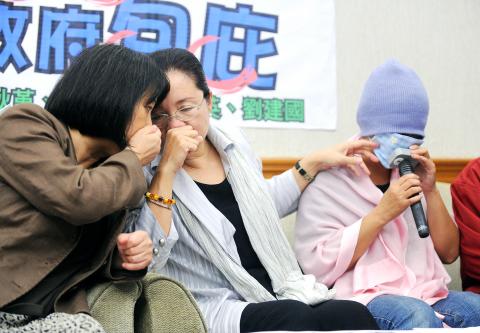|
Firm hiring Chinese, say employees
LABOR:One employee at Young Fast Optoelectronics said a
Chinese employee told her they were there to ‘support’ in ‘basic tasks,’ not for
professional training
By Vincent Y. Chao and Shelley Huang / Staff
Reporters

Democratic Progressive Party legislators Huang
Sue-ying, left, and Tien Chiu-chin, center, join workers and labor union
officers from Young Fast Optoelectronics Co, Ltd at a press conference in Taipei
yesterday. The union alleges that the company is illegally employing workers
from China under the guise of training.
Photo: Lo Pei-der, Taipei Times
Employees of Young Fast Optoelectronics Co, Ltd (洋華光電) and a
labor union spoke out against the electronics company yesterday, alleging the
company had been illegally employing Chinese workers under the guise of
professional training.
Allegations surfaced in the Chinese-language Next Magazine earlier this month
that Young Fast, a key supplier of touch-screen components for HTC Corp and
Samsung Electronics, had sent groups of 20 employees from its factories in China
to work 12-hour shifts at a manufacturing center in Taoyuan County.
Chinese nationals are currently barred from working in Taiwan.
Union representatives told a press conference yesterday that despite a recent
National Immigration Agency (NIA) investigation, the practice is still
continuing and has grown even more prevalent, -directly impacting Taiwanese
jobs.
A woman who claimed to be a current employee at Young Fast who wished to remain
anonymous said the Chinese workers told her they were not in Taiwan for
training.
“They said no,” the employee said. “They said they were here to support us in
doing more basic tasks.”
Another woman who said she was a current employee added that Young Fast
frequently gave some of its overtime positions to the Chinese workers, who would
receive lower pay. She said the Chinese workers received about NT$9,000 a month
compared with about NT$18,000 for female and NT$19,500 for male employees at the
factory.
“It’s very clear that [the company] allowed them to come to Taiwan and compete
with us local workers,” she said.
The company has rejected the allegations, saying in a statement earlier this
month that the Chinese workers were in Taiwan only for additional training. The
program followed procedures set out by government agencies, the statement said.
An investigation by the NIA on Oct. 7 could not verify the allegations and
cleared the company of any wrongdoing. In a statement -released afterwards, it
said it did not find the Chinese workers engaging in any unlawful behavior.
However, Democratic Progressive Party (DPP) lawmakers, speaking at the same
press conference, said that the investigation was inconclusive because it took
place after media reports first broke the story. The company could have
temporarily cleaned up its act, DPP Legislator Huang Sue-ying (黃淑英) said.
According to figures released by the NIA, 180,000 applications by Chinese
businesspeople and professionals to visit Taiwan were -approved last year, up
from 90,000 the previous year. As of August, more than 160,000 such applications
had been approved with the total number expected to top 200,000 by the end of
this year, said Son Yu-lian (孫友聯), secretary--general of the Taiwan Labour
Front.
While the Act Governing Relations Between the Peoples of the Taiwan Area and the
Mainland Area (臺灣地區與大陸地區人民關係條例) forbids Chinese citizens from working in Taiwan,
companies that fulfill certain criteria are allowed to apply in advance for
teams of employees to visit Taiwan for professional development.
Visits are limited to four months per year and the participants are prohibited
from engaging in “normal working behavior.”
“The government’s opening up the country to ‘business professionals’ from China
for professional development is the [President Ma Ying-jeou (馬英九)]
administration’s way of opening up the country to workers from China,” DPP
Legislator Tien Chiu-chin (田秋堇) said.
Labor activists said that despite election promises that the -government would
not allow Chinese workers into the country, what has happened at Young Fast and
allegedly at other electronics makers proves that the promises have not been
fulfilled. They said that the president, Premier Wu Den-yih (吳敦義) and Council of
Labor Affairs (CLA) Minister Jennifer Wang (王如玄) must take political
responsibility.
In response, the CLA said it would step up efforts to make labor inspections and
to promptly issue fines of up to NT$1 million (US$30,000) to businesses that
illegally hire workers from China.
|
![]()
![]()
![]()